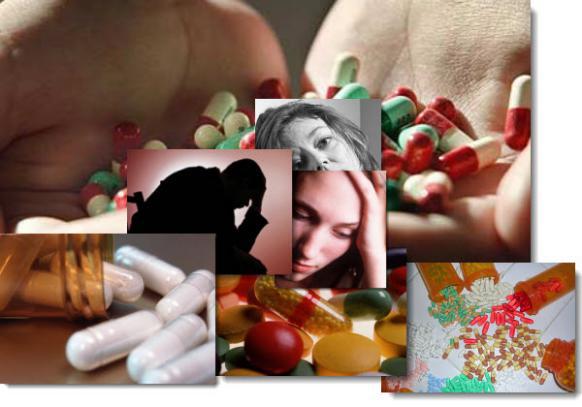Your busy schedule is not doing your body any good. When you do not give your body time to relax, it fails to fight and recover from stress and challenges it has to go through every day. You will eventually be visiting your doctor's office to get a prescription that would help your body heal better. Stress can affect your immunity and make you vulnerable to infections, and that is when you have to take antibiotics to clear infections. The problem is that overuse of antibiotics can cause several problems. And many ask if antibiotics can cause depression. Let's find out more about it.

Can Antibiotics Cause Depression?
Doctors prescribe antibiotics to treat different types of bacterial infections. Not only do they stop the growth of bacteria, they also eliminate them from your body. Many experts are of the view that even though antibiotics do not cause depression, they can certainly increase your risk of depression and anxiety. The reason is that antibiotics can affect your gut flora and lower the number of healthy bacteria in your gastrointestinal tract. The change in gut flora can make you feel tired and depressed.
When you change in your gut flora, you may experience several psychological side effects, including dizziness, nausea, and abdominal discomfort. These side effects can make you anxious and lead to depression. It is worth mentioning that these symptoms are not very common, and most people experience no serious issue during their antibiotic course. In case you are experiencing some mild symptoms, talk to your doctor immediately and start taking probiotics to increase the number of healthy bacteria in your gut.
As mentioned already, you do not always need to worry about developing any psychological symptoms while taking antibiotics, but it is better to inform your doctor if you have a history of depression, anxiety, or another mental disorder. Patients with a medical history of anxiety are more likely to develop depression symptoms while taking antibiotics. Therefore, you should talk to your doctor about it, so they could select a right therapy for you.
Common Side Effects of Antibiotics

Can antibiotics cause depression? You already know the answer, but you need to understand that taking antibiotics is not free of risk. You may develop a number of side effects while taking the prescribed antibiotics. For instance:
1. You May Develop Digestive Problems
Statistics show that 1 in 10 patients who are taking antibiotics will go on to develop digestive system problems like vomiting, nausea, indigestion, diarrhea, and bloating. Some patients may also complain about a loss of appetite. Abdominal pain is another common side effect of antibiotics. In most cases, these side effects are not very serious and settle down without any additional treatment. You notice improvement as soon as your course of medication is completed. Be sure to talk to your doctor if your digestive problems persist even after completing your course.
2. You May Have Compromised Immunity
Your immune system may suffer because antibiotics can directly affect the gut flora. When the number of healthy bacteria in your gut goes down, it affects your immune system in a negative way. Under normal circumstances, there will be a higher percentage of healthy bacteria in your gut, but antibiotics can kill those good bacteria giving disease-causing bacteria a chance to take over your digestive tract. It exposes you to an increased risk of infections.
3. You May Develop Metabolic Disorders
Long-term use of antibiotics may also be responsible for increasing your risk of metabolic disorders. Again, it could happen because of a change in your gut flora caused by antibiotics. The change in your gut flora increases your risk of autoimmune and inflammatory disorders and even leads to metabolic disorders, such as diabetes, obesity, and metabolic syndrome. Chronic inflammation can cause fat accumulation and lead to obesity, fatty liver disease, type-2 diabetes, and cardiovascular disease.
4. You May Develop Type-1 Diabetes
Can antibiotics cause depression? They can certainly increase your risks. And not just that, antibiotics may also increase your risk of developing insulin-dependent type-1 diabetes after taking antibiotics. Several studies have identified a connection between antibiotic use and type-1 diabetes. However, studies have also found that a single course of antibiotics might not increase your risk, but your diabetes risk certainly goes up after 4-5 antibiotic courses. The risk is considerably higher with antibiotics, such as macrolides, quinolones, penicillin, and cephalosporins.
5. You May Develop Yeast Infections
Research shows that a prolonged use of antibiotics can lead to a considerable increase in the risk of developing vaginal yeast infections. A change in gut flora may provide fungal species like Candida albicans to grow exponentially and cause a yeast infection. Many animal studies have confirmed this finding. You may lower your risk of vaginal yeast infections if you take Lactobacillus acidophilus tablets. Increasing your intake of yogurt with live cultures may also help.
6. You May Develop Mouth Sores
By affecting your gut flora, antibiotics can cause several problems, and it is also possible to develop mouth sores, candidiasis, or oral thrush because of a yeast overgrowth. Research suggests that antibiotics can also increase your risk of developing blisters and mouth ulcers. The risk is considerably higher with medicines like amoxicillin.
7. You May Have Tooth Discoloration
One of many side effects of antibiotics is tooth discoloration. It is especially true for antibiotics such as beta-lactam and tetracycline antibiotics. Tetracycline leads to permanent discoloration when given to children under the age 8. It is important to avoid it in pregnancy because it can affect your baby, especially if you take the antibiotic during the second trimester. In adults, the effects (tooth discoloration) are rather superficial and reversible. You may get good results simply by learning to brush your teeth properly.
